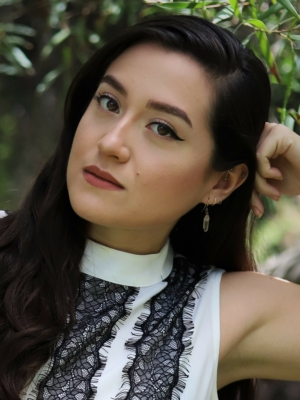Word From the Editor
As a species, human beings have recorded stories, both personal and collective, in order to survive. We tell stories to keep ourselves accountable, to stay connected with our loved ones, and to recreate precious moments in our minds. Whether we are writing, singing, or creating with our hands, the human soul is driven by narrative.
With a staff of over forty volunteers, Lunch Ticket’s sixteenth issue was created by the talent of authors and artists from around the world, and it was curated by the diligent and thoughtful collaboration of editors and designers from different backgrounds. Twice a year, the hard-working students of Antioch University put out an issue to add to the conversation of social justice. We engaged together in our experiences making informed, careful decisions as a group that best represents our mission and the greater social justice community.
While the physical is what we describe and try to embody with our words, the intangible gives life to any testimony: “Some [have] become totems; sacred reminders.” Eileen Collins put away her daughter’s trinkets, but carried around with her the things “that lived outside the plastic bin.” Memories kept after a loved one’s passing or displacement aren’t their belongings, but our meditation on their legacy—“I always take the time to think of her. This is as close to prayer as I can get.” The Diana Woods Memorial Award winner is praised by our special guest judge and Lunch Special author feature, Chris Feliciano Arnold: “[A]n achingly mournful essay about home, loss and the bonds of love… [Eileen Collins] knows how to create mystery and intimacy through unforgettable, haunting details that reveal a family’s deepest wound.”
Lunch Ticket is a safe space for those who have experienced trauma and who are looking to exercise mourning. Our journal is a sanctuary built for peace and triumph in a period that seeks to keep us in the dark. Gabo Prize winner Scott Chua translates Enrique S. Villasis’s poem “Buwaya” (“Crocodile”). Chua translates: “Amazing how the universe/ Honors the death of a creature// Like this. Keeping vigil with flame/ and perfume./ Without judgment for how it lived.” Guest judge Michael Bazzett praises “Buwaya”: “Chua’s translation employs a steady music and propulsive enjambment to capture this unsettling vitality. These poems sing with clarity even as they leave me hungry for more.” We all fear the crocodile, “the darkness that resides both without and within,” but Villasis ensures that there is still reason to “believe in life again.”
Though “at the end of [our] travels/ Will [we] be measured by what [we] have learned,” we understand that the first step toward a more just world outside of the literary and artistic, is within young endeavors. Victoria Richard’s “Sticky Hands, Wild Hair, Bare Feet” is a poetry and fiction hybrid in the YA genre that speaks of an audience not commonly known as an underserved community. Along with our YouthSpotlight: School Lunch series, where we publish work from writers and artists between the ages of thirteen and seventeen, this is “a powerful body unexplored.” We believe work written for children and teens is just as important. Recalling and empowering the child within, Richards encourages youth to do as she does: “I swam for the sake of swimming./ I sang for the sake of song./ I am voiceless with wild hair.”
At Lunch Ticket, we also pride ourselves in showcasing cutting-edge art that upholds our social justice mission. Our featured art series “The Beauty in Us” by Famous Umobuarie draws inspiration from the late singer Fela Kuti: “If you want to bathe your child, you go use water; if you want to cook, you go use water; water calms a hot head.” His hyperrealistic drawings communicate by using bodies and texture. For Umobuarie, drawing the feminine figure “is not passive, it is not an object: it is an agent of expression.”
Whether we are born into art and literature or educated by it or simply find ourselves within it, Dara Herman Zierlein defines the role of art in life as freedom. In her essay “Politics and Art,” she guides us through her discovery of political art, and how she found herself there, despite her previous displacement from the genre and the study. Her inspiration: “self-governance in a free society.” Zierlein’s art uses shocking imagery and bold color to evoke urgency, often to the dismay of viewers who ask why she doesn’t “start making pretty pictures” instead of using her work to advocate awareness in the world. She reminds us that the end of this decade also inches closer to the one-hundredth anniversary of the women’s suffrage movement, and of our obligation as equal humans to fight for what Webster’s Dictionary defines as “the state of being free from the control or power of another.” Freedom.
At Lunch Ticket, we continue to push forward stories that resist an era of regression; work that empathizes and does not profit off of the act of empathy. As writers and artists, our creativity and relentless nights with our hands fight against perspectives of hate and carry the vulnerable into a more just and more equal future; “…there is plenty of life to be lived and lots of ocean to drown in. Maybe a few opportunities to swim.”
Enjoy the voices of our community, as we have enjoyed hearing yours.
Amanda Lopez is a poet studying for her MFA at Antioch University Los Angeles (AULA), where she served as the Editor-in-Chief of the 16th issue of Lunch Ticket. She has served as a management assistant for Write Bloody Publishing and read on the literary journal The Redlands Review as Poetry Editor during her undergraduate years at the University of Redlands. Her work can be found forthcoming in The Nasiona.





